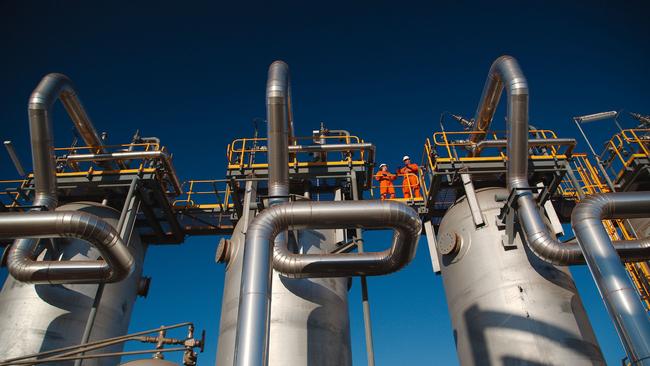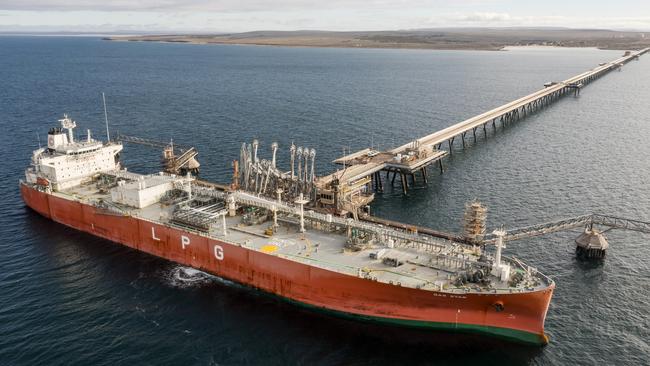Big super funds in spotlight over fossil fuel exposure
An analysis of holdings by the 15 largest superannuation funds shows investments of at least $25bn in expansionary coal, oil and gas companies, despite their net-zero goals.

Business
Don't miss out on the headlines from Business. Followed categories will be added to My News.
The nation’s largest superannuation funds still hold huge exposure to companies expanding oil, gas and coal projects, with a green group calling for the investors to use their influence to force big polluters such as Woodside Energy, Santos and Chevron to cut their emissions.
An Australian Conservation Foundation (ACF) analysis of holdings disclosures as of March 31 by the 15 largest superannuation funds show investments of at least $25bn in expansionary coal, oil and gas companies, despite their net-zero goals.
AustralianSuper, Unisuper, HESTA and Australian Retirement Trust are the biggest investors in companies investing in fossil fuel expansion, it says.
“A growing number of Australians don’t want their retirement savings locking in greenhouse emissions with new projects when they could be building clean energy infrastructure for the 21st century,” ACF’s corporate campaigner Jonathan Moylan said.
The report calls on funds to divest from all coal, gas and oil companies expanding fossil fuel production or use, set clear interim targets to phase out of fossil fuels, and use their influence to push those companies to cut emissions.
“Australia’s superannuation funds could be a leader on climate change in line with their commitments to reach net zero emissions and keep global temperature rise below 2 degrees,” the report says.

Superannuation funds have a duty to produce risk-adjusted returns for their members. The price of a stock such as Woodside, the largest listed oil and gas company in Australia, has more than doubled since its pandemic troughs. Divesting from it would have meant members would have missed out on the windfall.
Media representatives for the funds did not respond to messages seeking comment on Sunday, but have defended their positions in the past.
All 15 funds named by ACF still have holdings in Woodside, despite the company’s plans to continue to invest in new oil and gas developments, including the $US5bn Trion oil project in Mexico, and the $16.5bn Scarborough gas project in Western Australia.
Only three funds, including the Australian Retirement Trust, remained invested in US energy major Chevron. But the call for climate action to meet global climate goals has intensified across investment circles in recent years, with big investors either divesting their holdings or voting against climate policies of companies like Woodside, Santos, Shell, Rio Tinto and Glencore.

The Woodside board risk a second climate protest vote at its annual general meeting later this month, when three longstanding directors face re-election.
Institutional investors Vision Super and Betashares joined activist shareholder group Australian Centre for Corporate Responsibility in calls to oppose the re-election of three directors at the April 28 meeting to hold them accountable for what they say is their “repeated failure” to respond to investors’ concerns on climate change. They argue Woodside’s latest climate plan, released in February, fails to address concerns raised last year when 49 per cent of shareholders rejected an earlier version of the company’s climate report.
“Woodside is not currently excluded from our investment portfolio as it contributes to members’ returns helping to deliver on our overall investment objectives and our legislated duty to act in members’ best financial interests,” ART said in a statement in answers to member questions last month. “Over the past year, we have engaged with Woodside on a number of occasions in relation to climate change. We are seeking to be more focused in our company engagements and set objectives to track and monitor outcomes.”
UniSuper chief investment officer John Pearce last year said divesting from companies such as oil and gas major Santos “would not solve any problems” and their holding was too small to “engage” with the companies. “There are no shortage of buyers for Santos; whether it’s Santos or Woodside, all we would be doing is transferring the stock to someone else who would be very happy to take it off our hands,” he said.
More Coverage
Originally published as Big super funds in spotlight over fossil fuel exposure



